Navigating the Road Accident Fund’s maze of claims? Discover the essential guide to understanding Loss of Earnings (LOE) in RAF claims.
Unravel the complexities, master the nuances, and arm yourself with knowledge to secure what you truly deserve. Dive into our comprehensive article for insights that can turn the tide in your favor.
Introduction
The Road Accident Fund (RAF) in South Africa serves as a pivotal mechanism for offering financial compensation to individuals who have suffered losses due to road accidents.
Understanding the intricacies of claims related to the loss of earnings is not just a matter of legal formality. It’s a crucial step in ensuring that victims and their families receive the justice and support you deserve.
This article aims to demystify the complex yet vital concepts of loss of earnings within the framework of the RAF claims.
At the heart of many RAF claims is the concept of loss of earnings. Loss of Earnings (also known as Loss of Income or simply LOE) is a term that encompasses various facets of financial compensation.
These facets include loss of past earnings, loss of future earnings, loss of earnings, and loss of earning capacity. Each of these terms, while interrelated, carries distinct meanings and implications for claimants.
Understanding these differences is essential for anyone navigating through the aftermath of a road accident, particularly when seeking fair compensation.
Loss of earnings claims are not just about immediate financial needs. They represent the ongoing economic hardships that accident victims and their families often endure. These claims serve as a crucial lifeline, providing much-needed support during a time of unprecedented change and challenge.
Whether it’s the loss of income since the accident or the diminished capacity to earn in the future. These claims address the diverse impacts that accidents can have on the financial lives of families in the event of injury by a bread-winner.
By examining real-life case studies, we bring these concepts to life. We also explore the subtle yet significant differences between the various types of loss of earnings claims.
The purpose?
To provide you with the knowledge you need to navigate their claims effectively.
You may be at the beginning stages of filing a claim, seeking legal advice, receiving a RAF settlement letter, or anywhere in between.
This article aims to be a valuable resource in your journey towards securing just compensation.
The Road Accident Fund: An Overview
Brief History and Purpose of the RAF
The Road Accident Fund (RAF) in South Africa is a public entity established by the Road Accident Fund Act of 1996. It succeeded the Multilateral Motor Vehicle Accidents Fund with a mission to provide appropriate cover to all road users within the borders of South Africa.
The RAF serves a critical function in the South African social landscape: offering compulsory cover to all drivers against injury or death caused by motor vehicles. Its establishment marked a significant shift in how victims of road accidents could seek compensation.
Today the RAF is a cornerstone of the country’s approach to dealing with the aftermath of road accidents.
The primary purpose of the RAF is to compensate individuals who have been injured in road accidents or the dependents of those who have died as a result of such accidents.
This compensation is not just about addressing immediate medical costs. It also extends to cover loss of income or support, general damages for pain and suffering, and funeral expenses.
The fund (financed through a levy on motor fuel) ensures that victims of road accidents are not left to deal with the financial burden of their injuries or loss on their own.
The Claimant’s Legal Rights during the RAF Claims Process
South Africans are entitled to basic rights under the national constitution. There are several legal rights which become evident in the Road Accident Fund claims process.
Right to Compensation: Every claimant has the right to seek compensation for losses incurred due to a road accident. This includes the right to file a claim for Loss of Earnings (LOE) if the accident has impacted their ability to earn.
Right to Fair Assessment: Claimants are entitled to a fair and unbiased assessment of their claims by the RAF. This includes a thorough review of all documentation and evidence submitted.
Right to Appeal or Dispute Resolutions: If a claim is rejected or if the compensation offered is deemed insufficient, claimants have the right to dispute the decision and seek a reassessment.
Right to Information: Claimants have the right to be informed about the status of their claims, the RAF’s decision-making process, and the reasons for any decisions made regarding their claims.
Right to Privacy and Confidentiality: Personal information and details of the claim must be handled with confidentiality and respect for the claimant’s privacy.
Understanding and exercising these legal rights in the RAF claims process not only empowers claimants in seeking justice and fair compensation. It also ensures a more transparent, respectful, and effective handling of their claims.
It’s essential for claimants to be aware of these rights to navigate the process knowledgeably and confidently.
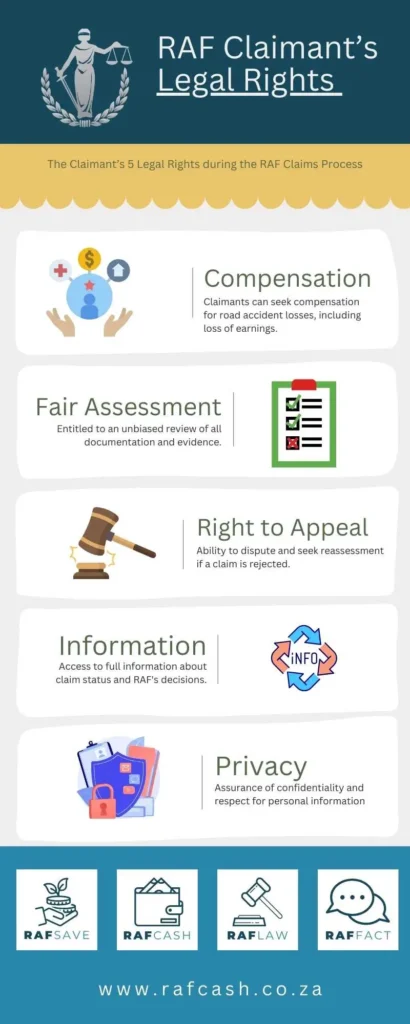
Overview of Types of Claims Covered
The RAF covers several types of claims, each designed to address specific aspects of loss and damage suffered by road accident victims.
These include:
- Medical Expenses: Covering the costs of treating injuries sustained in a road accident.
- Loss of Support: Providing for dependents who have lost a breadwinner due to a road accident.
- General Damages: Compensation for pain, suffering, and disfigurement resulting from the accident.
- Funeral Expenses: Covering the costs associated with the burial of a deceased accident victim.
A significant focus within these claims is on ‘Loss of Earnings’ (LOE) claims, which are particularly complex and impactful.
LOE claims are designed to compensate individuals who have lost the ability to earn an income due to injuries sustained in a road accident.
These claims are critical as they address the long-term financial impact of an accident on a victim’s life, including both past and future losses.
Statistical Insights into the RAF’s Payouts
The financial implications of Loss of Earnings claims on the Road Accident Fund are substantial.
According to the RAF’s Annual Reports, approximately R22 billion Rand is paid out annually in LOE claims. This accounts for about 50% of the total R45 billion in annual RAF personal claims.
This staggering amount underscores the significance of LOE claims in the broader context of RAF compensation.
Over the past five years, LOE claims have seen a roughly 30% increase. This trend that continues to rise in tandem with salary inflation.
This not only reflects the growing need for financial support among road accident victims but also the increasing recognition of the long-term economic impact of such injuries.

The substantial payout of LOE claims in South Africa highlights the importance of this compensation type. This reflects the profound and lasting financial impact road accidents can have on individuals and families.
Understanding Loss of Earnings: Key Concepts
Navigating the complexities of Loss of Earnings (LOE) claims within the Road Accident Fund (RAF) framework requires a fundamental understanding of what these claims entail and how they differ. This section provides a detailed exploration of the key concepts related to LOE, including its definition and the crucial distinction between loss of past earnings and loss of future earnings.
Definition of Loss of Earnings
Loss of Earnings in the context of RAF claims refers to the financial compensation for earnings that an individual is unable to receive due to injuries sustained in a road accident.
This encompasses not just the immediate loss of income but also the potential future earnings that are impacted by the accident.
Essentially, LOE claims are designed to restore, as much as possible, the financial situation the claimant would have been in had the accident not occurred.
Understanding the nuances of LOE claims is not merely a matter of legal procedure. It’s about ensuring justice and fair compensation for those who have endured loss due to road accidents.
Distinction between Loss of Past Earnings and Loss of Future Earnings
Loss of Past Earnings
This component of LOE claims addresses the income that the claimant has already lost from the time of the accident to the date of the settlement or trial.
It’s a retrospective calculation, compensating for the actual income loss the claimant has endured due to their inability to work during this period.
For example, if a professional earning a monthly salary is unable to work for a year due to an accident. The loss of past earnings would include the total salary they would have earned during that year.
Loss of Future Earnings
In contrast, Loss of Future Earnings pertains to the compensation for the income the claimant is likely to lose after the trial. This extends into all future lifetime earnings.
This is a more complex calculation. It involves projecting the potential earnings the claimant would have made had the accident not occurred.
This projection takes into account various factors such as the claimant’s age, career trajectory, and the lasting impact of their injuries.
Specialist actuaries use sophisticated statistical models to perform these calculations on behalf of attorneys or the RAF.
For instance, if the accident results in a permanent disability that prevents the claimant from continuing in their previous profession or any profession at all, the calculation would estimate the income they would have reasonably expected to earn in the future.
Explanation and Examples
To illustrate these concepts let’s consider the case Max. Max is a 30-year-old software developer who earned a significant annual salary of R2 million per annum.
Max was involved in a road accident leading to a temporary inability to work for seven months. His employer provided 1 month of paid leave. His claim for loss of past earnings would therefore cover the salary for that remaining six-month period.
However, the injuries lead to a permanent disability affecting his ability to work in the same capacity. This required a career change to a less lucrative field.
The claim for loss of future earnings would include a calculation of the reduced potential earnings over their expected working lifetime. For example, to retirement age of 65.

Understanding the nuances of Loss of Earnings claims is essential for RAF claimants.
This understanding not only helps in accurately calculating the compensation due but also in setting realistic expectations about the outcomes of their claims.
By recognizing the differences between loss of past and future earnings, claimants can more effectively navigate their claims process with the RAF.
Loss of Earning Capacity: A Deeper Dive
Definition and Explanation of Loss of Earning Capacity
Loss of Earning Capacity refers to the reduction in a person’s ability to earn income as a result of injuries sustained in a road accident.
It is not merely a measure of lost wages or salary. It measures a broader assessment of the diminished potential to earn in the future.
This concept takes into account the impact of the injury on the individual’s capacity to perform work, engage in their profession, or advance in their career.
The key factor here is the potential earning capacity that has been compromised. Regardless of whether the person was earning at the time of the accident or not.
It’s about the likelihood of what could have been earned had the accident not occurred, encompassing future career prospects, promotions, and potential shifts in professions.
Differentiating between Loss of Earning Capacity and Loss of Earnings
While both Loss of Earning Capacity and Loss of Earnings deal with financial repercussions of an accident, they focus on different aspects:
- Loss of Earnings is concerned with the actual earnings lost, both past and future, as a direct result of the accident. It’s quantifiable based on the individual’s earning history and the income they are no longer receiving due to their injuries.
- Loss of Earning Capacity is a more speculative concept, focusing on the reduced ability to earn income in the future. This includes considering career trajectories, skill development potential, and even the likelihood of entering into more lucrative fields of work, had the accident not occurred.
Hypothetical Scenarios
Let’s consider the following 2 examples:
Case 1: High School Student
Imagine a high school student with no job history and promising academic performance aiming for a high-earning career.
If they suffer injuries in a road accident that significantly limit their potential career options, their Loss of Earning Capacity claim would focus on the diminished potential to earn in those high-paying roles they might have otherwise pursued.
In this case, proving Loss of Future Earnings might be challenging due to the lack of an earnings history. However, the impact on their earning capacity is more evident and

Case 2: Mid-Career Professional
Consider a mid-career professional who is well-established in their field. If an accident results in injuries that prevent them from continuing in their current profession, there’s a clear loss of current earnings.
Additionally, if the injuries limit their ability to switch to a similarly lucrative career or hinder future promotions, this impacts their earning capacity. This will lead to a compensation claim that reflects both the loss of actual earnings and the reduced potential to earn in the future.
Understanding this distinction helps claimants and legal professionals accurately evaluate and argue for the full scope of compensation owed to the accident victim.

Case Studies: Real-Life Applications
Examining real-life case studies from the Road Accident Fund (RAF) in South Africa provides invaluable insights into how Loss of Earnings (LOE) and Loss of Earning Capacity claims are assessed and calculated in practice.
This section will delve into three distinct case studies, highlighting the nuances of legal arguments, the process of calculating compensations, and the implications of the judgments rendered.
Case Study 1: Van Rensburg N.O. v Road Accident Fund
The case Van Rensburg N.O. v Road Accident Fund involves the plaintiff Janse Van Rensburg, representing Sabelo Diba, who suffered serious injuries in a road accident.
The case was adjudicated by the High Court of South Africa, Free State Division, Bloemfontein. It focused on Diba’s claim for damages against the Road Accident Fund due to these injuries.
Key Facts
Diba was injured in December 2017 while traveling as a passenger in a vehicle that lost control and overturned. He suffered significant injuries including head injury, facial fractures, and a C5-6 disc injury.
Due to his neurological injuries, Diba required a curator ad litem for the litigation.
Legal Arguments and Judgment
The merits of the case were conceded by the RAF. This lead to a focus solely on the quantum (the amount) of the claim. The judgment was based on multiple expert reports detailing Diba’s injuries and their impact.
Loss of Earnings Award
The court considered detailed medical reports and expert testimony to assess Diba’s Loss of Earnings. The exact amount of the award was determined based on these assessments, considering Diba’s injuries and their impact on his future earning capacity and quality of life.
The final loss of income claim was for the amount of R2 906 283.
This was split into R 339 263 for past loss of earnings, as well as R2 567 020 for future loss of earnings.
For a detailed overview of the judgment and its implications, you can read the full court documents.

Case Study 2: M.M obo D.M v Road Accident Fund
The case M.M obo D.M v Road Accident Fund involved a claim for damages against the Road Accident Fund for injuries sustained by DM, a minor child, in a motor vehicle-pedestrian accident. The claim was brought by the child’s mother and natural guardian, MM. (Names abbreviated to respect the privacy of individuals)
Key Facts
DM sustained severe injuries in the accident, including a degloving injury to his left heel, resulting in scarring, an abnormal gait, and an Achilles tendon shortening.
The RAF conceded 100% liability for the damages, and the focus was on determining the quantum of compensation.
Legal Arguments and Judgment
The court was tasked with determining fair and reasonable compensation for general damages, as the loss of earnings claim was already settled inter-parties.
The final judgment awarded an amount for general damages, considering the severity of DM’s injuries and their long-term impact.
Loss of Earnings Award
The loss of earnings claim was settled for an amount of R1 086 780, based on assessments from various medical and occupational experts.
This compensation was aimed at covering DM’s future earning capacity, which was impacted due to the injuries sustained in the accident.
For a detailed overview of the judgment and its implications, you can read the full court documents.

Case Study 3: Sikhonde v Road Accident Fund
The case Sikhonde v Road Accident Fund involves Sikhonde Nkosinathi Vincent. He filed a claim against the Road Accident Fund for damages resulting from personal injuries sustained in a motor vehicle accident.
The plaintiff, a passenger in the vehicle, suffered injuries affecting his earning capacity. The RAF accepted full liability, and the court focused on determining the compensation amount.
Key points in the judgment include the consideration of expert medical and occupational reports to assess the impact of the plaintiff’s injuries on his earning capacity.
The compensation awarded aimed to reflect the financial loss due to the injuries, including past and future loss of income. The final award was R1 074 347.
For a detailed overview of the judgment and its implications, you can read the full court documents.

Implications of the Judgments
These cases underline the RAF’s commitment to fairly compensating accident victims not just for their immediate losses but also for their long-term financial security.
They illustrate the critical role of detailed assessments and expert testimony in determining appropriate compensation.
Each case also demonstrates the RAF’s recognition of both tangible and potential losses. circumstances.
These case studies provide essential learning points for legal professionals and claimants alike, emphasizing the importance of a thorough and well-substantiated claim process.
They also highlight the importance of considering individual circumstances in LOE and Loss of Earning Capacity claims.
This ensures that compensation is justly aligned with the actual and potential impacts of the injuries sustained.
*Note that these examples are illustrative only. Outcomes can vary significantly from case to case depending on a multitude of factors.
The Claims Process: Filing and Calculating Claims
Navigating the claims process with the Road Accident Fund (RAF) in South Africa, especially for Loss of Earnings (LOE) claims, can be complex.
This section explains the steps you can take to ensure the best possible claim outcome. This includes understanding the necessary documentation and evidence, and insights into how compensation is calculated.
Maximizing Outcomes through the Claims Process
- Initial Assessment: Before filing a claim, it’s crucial to assess the extent of your injuries and how they impact your ability to earn. Consulting with medical and legal professionals can provide a preliminary understanding of the claim’s potential.
- Gathering Documentation: Essential documents include a police report of the accident, medical records detailing the injuries, proof of income (such as payslips or tax returns), and any relevant employment documents. It’s advisable to keep copies of all submitted documents for your records.
- Find an Attorney: Selecting a reputable and experienced attorney is possibly the single biggest factor that will impact your claims experience and outcome. RAF Law can assist you in sourcing a quality law firm.
- Medical Assessments: Your engagement and cooperation with medical experts can assist in your Road Accident Fund claim. Doctors’ expert reports will guide the judge in determining the impact of your injuries on your income. Disclose all relevant detail about your injuries and how they have affected your ability to earn a living. But don’t lie or exaggerate the truth as this may backfire.
- Decision and Settlement: If the claim is successful the RAF will propose a settlement amount. Loss of Earnings are likely to be the largest component. It’s vital to review this with your legal advisor before accepting.
- Payment: After finalizing your case the RAF takes 180 days or longer to pay. Bridging finance can assist you during this waiting period.
- Investment: A Loss of Earnings payout is compensation for past and future lost income. It is important that money is saved for long term needs rather than short term wants. RAF Save can help put you in touch with an expert Authorized Financial Advisor.
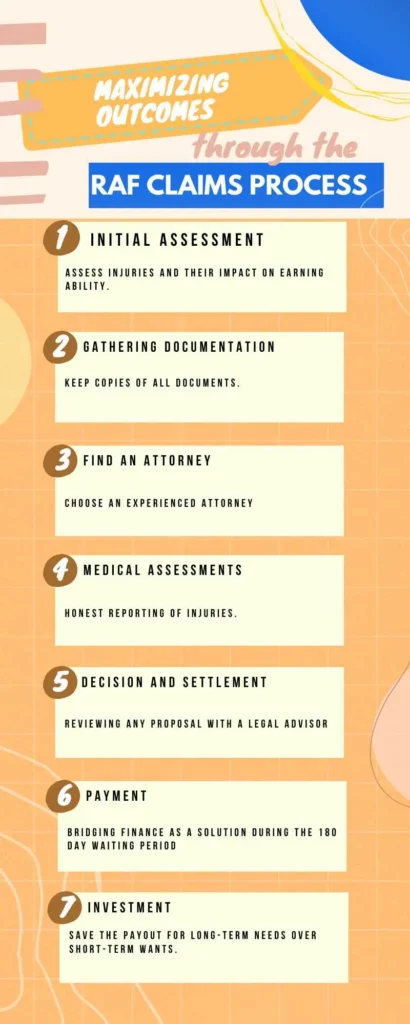
Insight into the Calculation of Compensation
The calculation of LOE compensation is done by a qualified expert witness actuary. This involves several factors.
- Current Earnings: Your current earnings provide a baseline for calculating lost income.
- Future Earning Potential: Estimations are made regarding future earning potential, considering career trajectory, inflation, and potential promotions.
- Duration of Impact: The expected duration of the impact of your injuries on your earning capacity is considered. This can range from temporary impairment to permanent disability.
- Mitigating Factors: Any mitigating factors, such as potential alternative employment or rehabilitation outcomes, are also taken into account.
Therefore these components are all likely to drive the final claim amount:
- Earnings before accident
- Earnings Trajectory before accident
- Career trajectory, including potential promotions
- Salary inflation
- Earnings Duration
- Current age
- Retirement age
- Nature of Injuries
- Temporary disability
- Permanent disability
- Impact of Injuries
- Ability to perform current work functions
- Ability to perform any work functions
- Ability to perform acts of daily living
- Mitigating Factors
- Potential alternative employment
- Rehabilitation outcomes
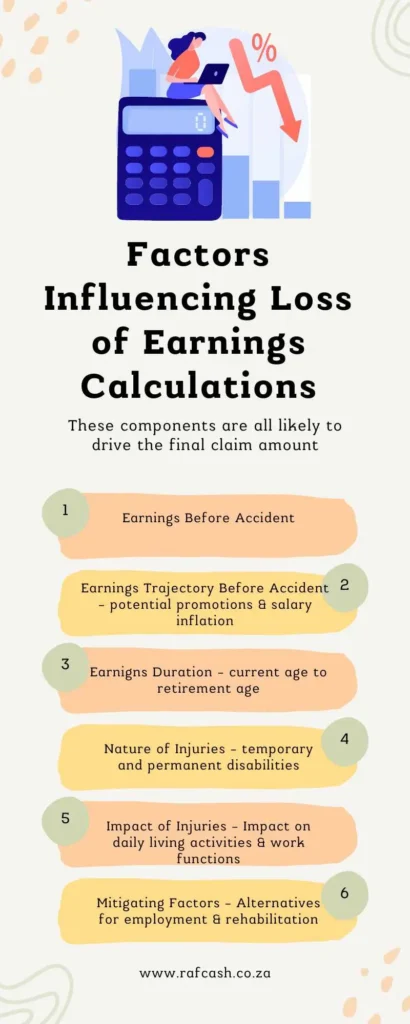
Filing an LOE claim with the RAF requires a detailed understanding of the process, meticulous preparation of documentation, and a thorough calculation of the compensation required.
It’s a process that demands accuracy and often the support of legal and medical professionals to ensure a fair and just outcome.
Challenges in Loss of Earnings Claims
Filing a claim for Loss of Earnings (LOE) with the Road Accident Fund (RAF) can be fraught with various challenges.
Most of these will be for your attorney to handle.
However, a cursory understanding of these obstacles and knowing how to navigate them can help attorney-client communication.
Common Issues Faced by Claimants
- Delays in Processing: The RAF often experiences backlogs, leading to prolonged processing times for claims. These delays can be frustrating for claimants awaiting compensation.
- Rejections or Disputes: Claims may be rejected or disputed for various reasons, such as insufficient documentation, discrepancies in the claim, or disagreements over the extent of the loss of earnings.
- Complexity of Calculating Loss of Earnings: Accurately calculating LOE can be complex, especially when projecting future earnings and accounting for factors like career progression, inflation, and the long-term impact of injuries.
- Communication Issues: Claimants sometimes face challenges in maintaining effective communication with the RAF, leading to confusion and uncertainty about the status of their claims.

Tips for Effectively Managing These Challenges
- Thorough Preparation: Ensure all documentation is complete, accurate, and well-organized. This includes medical reports, proof of income, and any other relevant paperwork.
- Seek Expert Advice: Engage with medical professionals, occupational therapists, and economists to provide comprehensive evidence and reports to support your claim.
- Regular Follow-ups: Maintain regular communication with the RAF. Keep track of your claim’s status and promptly respond to any requests for additional information.
- Be Proactive in Dispute Resolution: If your claim faces objections or disputes, address these issues proactively. Gather additional evidence or seek clarification on the reasons for the dispute.
- Patience and Persistence: Be prepared for a potentially lengthy process. Patience and persistence are key in navigating the claims process.
The process of claiming for loss of earnings can be challenging. Understanding these challenges, preparing adequately, and seeking the right professional assistance can significantly improve the chances of a successful and fair outcome.
Legal assistance, in particular, plays a pivotal role in navigating the complexities and ensuring that your rights and interests are effectively represented.
When and Why to Seek Legal Representation
Complexity of the Claim: Legal representation should be considered if the claim is complex, especially in cases involving substantial loss of earnings or intricate calculations of future income loss.
Disputes or Rejections: If a claim is disputed or rejected by the RAF, a legal expert can assist in appealing the decision, providing additional evidence, and negotiating on behalf of the claimant.
Lack of Experience with RAF Procedures: For those unfamiliar with RAF procedures and legal processes, a lawyer can provide guidance, ensuring that all necessary steps are followed correctly and efficiently.
Maximizing Compensation: Legal professionals with experience in RAF claims can help ensure that all factors impacting the loss of earnings are considered, potentially leading to a more favorable compensation outcome.
Reducing Stress and Administrative Burden: Dealing with the aftermath of a road accident can be stressful. Legal representation can alleviate the administrative burden, allowing the claimant to focus on recovery.
Understanding one’s legal rights during the RAF claims process is crucial.
It empowers claimants to make informed decisions and ensures that their claims are handled fairly and respectfully.
Legal representation plays a critical role, especially in complex cases, by providing expertise, advocating for the claimant’s rights, and striving for the most favorable outcome.
It’s about ensuring justice and fair compensation for those affected by road accidents.

Conclusion
As we conclude our comprehensive exploration of Loss of Earnings (LOE) claims within the framework of the Road Accident Fund (RAF) in South Africa, it’s crucial to summarize the key takeaways and reiterate the importance of understanding the nuances of these claims.
Summary of Key Takeaways
The RAF provides vital financial support to those affected by road accidents in South Africa, covering various types of claims, with a significant focus on LOE.
Claimants have fundamental legal rights during the RAF claims process, including the right to fair compensation and the right to appeal RAF decisions. Legal representation can be crucial, particularly in complex cases.
LOE claims are complex and encompass compensation for both past and future lost earnings due to accident-related injuries.
A clear distinction must be made between Loss of Past Earnings, Loss of Future Earnings, and Loss of Earning Capacity. Each has specific implications and requires a different approach in calculation and proof.
The real-life case studies provide invaluable insights into how LOE claims are assessed, calculated, and adjudicated, highlighting the complexities and challenges involved.
Claimants often face challenges such as delays, disputes, and the complexity of calculating claims. Effective management of these challenges is essential for a successful claim.
Seeking advice from legal, medical, and financial experts can significantly impact the outcome of a LOE claim, ensuring that all relevant factors are considered and maximized.
In summary, the journey through the RAF claims process can be intricate and challenging.
However, with a thorough understanding of the process, the right support, and persistence, claimants can navigate these challenges. The outcome will be worth the effort.
Call to Action
Don’t let the intricacies of Loss of Earnings claims overwhelm you.
For the best outcome, it’s crucial to have legal representation that deeply understands these nuances.
Visit RAF Law and connect with experts who can navigate the complexities of the RAF and help you secure the compensation you rightfully deserve.
Take the first step towards a successful claim today.
Glossary
- Loss Of Earnings (LOE): Compensation for income lost due to inability to work following a road accident.
- Claimant: A person who makes a claim, in this context, against the RAF for losses due to an accident.
- Compensation: Financial reimbursement provided to a victim for losses or damages.
- Settlement: An agreement reached between a claimant and the RAF regarding the amount of compensation.
- Appeal: The process of challenging a decision made by the RAF regarding a claim.
- Future Earnings: The projected income a person would have earned if not for the accident.
- Past Earnings: Income lost from the time of the accident until the claim is settled.
- Earning Capacity: The potential or ability of an individual to earn income in the future.
- Personal Injury: Physical or psychological harm to a person resulting from an accident.
- Medical Expenses: Costs incurred for medical treatment due to injuries from an accident.
- Legal Representation: A lawyer or legal firm that assists and represents a claimant in their case.
- Claim Process: The procedure followed by a claimant to seek compensation from the RAF.
- Dispute Resolution: The process of resolving disagreements between the claimant and the RAF.
- Claim Filing: The act of submitting a claim to the RAF for compensation.
- Litigation: The legal process of resolving a dispute in court.
Frequently Asked Questions
How Do I Know If I'm Eligible for a Loss of Earnings Claim with the RAF?
You’re eligible if you’ve suffered a loss of income due to injuries from a road accident in South Africa. It’s crucial to have evidence showing the impact on your earnings.
What Documents Do I Need for a Loss of Earnings Claim?
You’ll need a police report of the accident, medical records, proof of income (like payslips or tax statements), and employment documentation.
How Is Compensation for Loss of Earnings Calculated by the RAF?
Compensation is based on your current earnings, projected future earnings, and how your injury affects your ability to work.
Can I Claim for Loss of Earnings If I Was Unemployed at the Time of the Accident?
Yes, if you can demonstrate how the accident has impacted your earning capacity or potential future earnings.
What's the Difference Between Loss of Past Earnings and Loss of Future Earnings?
Loss of past earnings covers income lost from the accident to the settlement date, while loss of future earnings covers potential income loss after the trial.
How Long Does It Take to Process a Loss of Earnings Claim with the RAF?
Processing times vary, but it can be lengthy due to RAF’s procedural requirements and case complexities.
What Happens If My Loss of Earnings Claim Is Rejected?
You can dispute the decision, providing additional evidence or clarification to support your claim.
Why Is Legal Representation Important in RAF Loss of Earnings Claims?
Legal experts understand the complex RAF procedures, can accurately calculate claims, and effectively negotiate or dispute on your behalf.
What If My Injuries Don’t Seem Severe but Still Affect My Work?
Even less severe injuries can impact your earning capacity; it’s about how the injury affects your work ability, not just injury severity.
Can I Claim for Both Loss of Earnings and Medical Expenses?
Yes, you can claim for both loss of earnings and medical expenses, as they are separate components of RAF compensation.

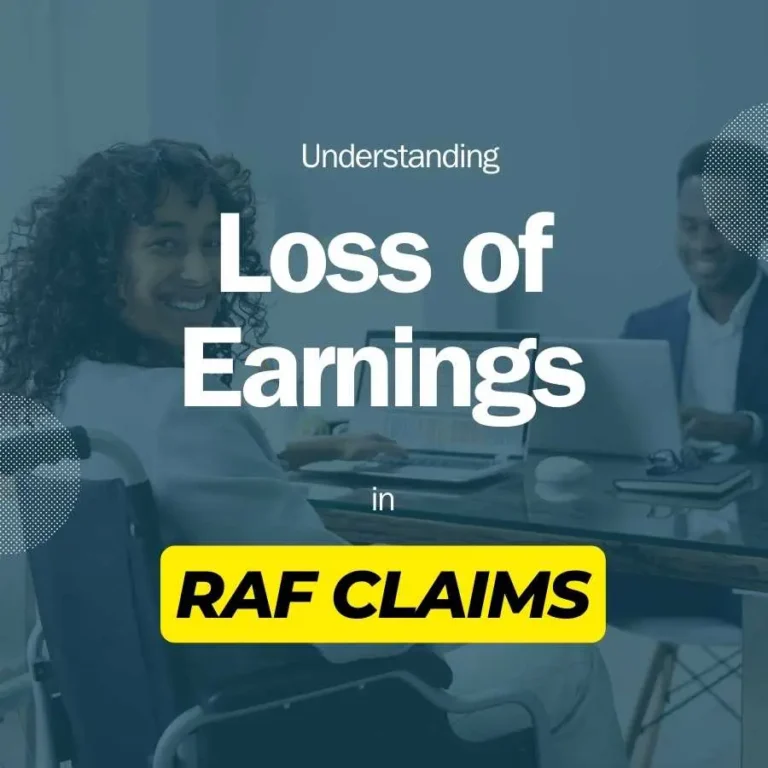

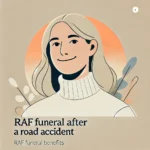
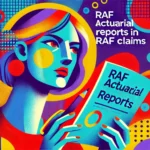

2 Responses
What do you do if you did not claim LOE in the initial RAF form lodged with RAF/
After summons have been issued and before the summons are issued.
Hi Pumzile. If you are making a personal claim then I advise speaking to the Road Accident Fund to guide you. You can find their details here: https://rafcash.co.za/get-in-touch-road-accident-fund-contact-details/. Alternatively you should ask your attorneys guidance on the best approach.